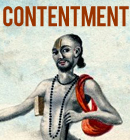It’s been interesting to discover how much resistance there is to thinking of contentment as the real goal of a spiritual life. This extract from a teaching I gave in Brooklyn last month makes the case that it is precisely the need – the compulsion – we feel to always have to do something to change any given situation that defines samsara or the cycle of suffering.
 Samsara is defined in a classic Sanskrit text, the Ashtavakra Gita, as “nothing other than the compulsion to act.†And this feeling of obligation to change what is comes from what is called “karma,†which by definition forces us to act.
Samsara is defined in a classic Sanskrit text, the Ashtavakra Gita, as “nothing other than the compulsion to act.†And this feeling of obligation to change what is comes from what is called “karma,†which by definition forces us to act.
And karma has always been the problem in Indian religions, not the solution. Karma may be good or bad, but all karma keeps us bound in samsara.
Acting freely would mean not only without compulsion but also without expectation. This is what Krishna means in the Bhagavad Gita by “karma yogaâ€: action done (freely) for its own sake, without regard for the “fruits†of action.
In the yoga texts, we learn about two energies – raga (wanting something you don’t have) and dvesha (not wanting something you do have) – which run our lives. These are the two forms of discontentment, and both of them compel us to act (to get something we want, and to avoid something we don’t want). The goal of yoga is to transform these energies into radical contentment and acceptance, which is sort of esoterically depicted as getting the energies to “enter, stay, and dissolve†into the “central channel†– a fancy way also of speaking about the ultimate stress-free condition, for stress is obviously a by-product of discontentment with what is.
“It’s like this nowâ€: the mantra of acceptance of reality. When times are good, pay attention and enjoy them fully instead of spacing out and taking them for granted. And when times are challenging, “it’s like this now†will help us focus on the situation at hand instead of running away from or sitting around wishing it were different.
 >> Download the mp3 here
>> Click here to subscribe to the podcast series with iTunes


